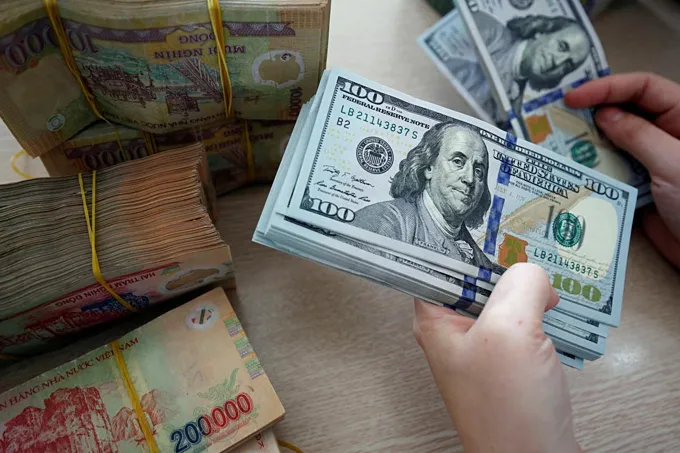
Journalist: - Most experts believe that the 0% USD interest rate policy should be maintained. What is your opinion on this matter?
Associate Professor Dr. Nguyễn Hữu Huân: - The primary goal of implementing a 0% per annum interest rate cap on USD deposits for organizations and individuals is to combat "dollarization" in the economy. When USD deposit rates are at 0%, people will compare holding non-interest-bearing USD with interest-bearing VND, reducing the motivation to hold USD. In reality, Vietnam has successfully reduced "dollarization" in the economy through this policy. If the policy changes, the risk of "dollarization" will increase, putting pressure on the exchange rate. Currently, the demand for USD in the economy remains significant. If the USD deposit interest rate is raised, people will tend to accumulate more, weakening the domestic currency, which will affect monetary policy management and macroeconomic stability. Meanwhile, Vietnam's foreign exchange reserves are not exceptionally high, making it challenging to withstand exchange rate pressures or shocks.
- But does this policy have any downsides?
- Of course, when implementing the 0% USD deposit interest rate policy, the degree of financial and monetary freedom is not high. Banks do not operate according to market supply and demand but under state administrative measures. This means that even if they want to increase interest rates to mobilize foreign currency according to demand, they cannot. This also exerts some pressure in foreign relations. For instance, when the United States examines whether Vietnam manipulates its currency, intervenes in the exchange rate to strengthen or weaken the domestic currency contrary to market supply and demand laws, there can be diplomatic repercussions. However, in recent years, the US has determined that Vietnam does not manipulate its currency. Therefore, I believe this policy should still be maintained for now.
- In your opinion, if we were to consider removing the 0% USD deposit interest rate cap, what conditions would need to be met?
- We can only change this policy when Vietnam's foreign exchange reserves strengthen significantly. It should be noted that combating "dollarization" in the economy involves not only implementing a 0% USD deposit interest rate policy but also other policies, such as gradually transitioning from a borrowing-lending relationship to a buying-selling foreign currency relationship or regulating that people can only purchase a maximum of USD 5,000 when traveling or studying abroad. If we revert to the old ways, where the policy is loosened, people can own as much USD as they want, buy USD at any time to hoard or deposit in banks for interest, then Vietnam's foreign exchange reserves must be substantial to handle such a scenario.
- The USD/VND exchange rate depreciated by 4-5% in the first seven months of 2024. What are your thoughts on this issue?
- Currently, the USD interest rate in the US is 4-5% per annum, and the VND interest rate is around 5-6% per annum. These interest rates are roughly equivalent, while the VND has depreciated by 5%. Vietnam's low interest rate policy supports economic growth over a long period, resulting in side effects like the continuous sell-off by foreign investors, particularly in the stock market. The foreign investors' sell-off is due to the interest rate disparity between the VND and the USD, not between the USD domestically and abroad.
Regarding exchange rate management, the SBV aims to stabilize the exchange rate as per their targets, leading to interventions and selling over USD 6 billion in foreign exchange reserves in recent months. However, Vietnam's foreign exchange reserves are not abundant. The national foreign exchange reserve size must continuously be maintained at around 10 weeks of imports, equivalent to over USD 80-90 billion. Currently, Vietnam's foreign exchange reserves are around this level, which is just about safe. Selling too much will push it to dangerous levels. At dangerous levels, there could be a currency attack, so the SBV is very cautious about selling foreign exchange reserves to stabilize the exchange rate.
The lessons from the 1997 Asian financial crisis remain relevant. At that time, Southeast Asian countries sold too much of their foreign exchange reserves, and when depleted, they announced a floating exchange rate, leading to the Thai baht losing 40% of its value within three months. Therefore, the SBV intervenes cautiously, avoiding indiscriminate interventions to prevent currency attacks.
Regarding solutions to alleviate exchange rate pressure, increasing VND interest rates this year could be beneficial. When VND interest rates are low, people will seek other channels, especially gold. Rising gold prices exert pressure on the exchange rate due to increased gold smuggling, which requires buying USD.
- Thank you for your insights.




















